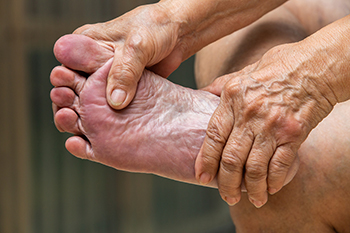
An abnormally high arch in the foot is known as cavus foot, which places a lot of pressure on the ball and heel of the foot when standing or walking. Other foot conditions may also be apparent, including hammertoe, calluses on the ball, side or heel of the foot, pain upon walking or standing, and the heel tilting inward. Cavus foot can also be linked to foot drop, where the foot drags while walking. It can develop at any age and result in both pain and instability. Many cases are thought to be caused by neurological conditions, including cerebral palsy, Charcot-Marie-Tooth disease, spina-bifida, muscular dystrophy, or stroke. In these cases, the condition is likely to worsen. In other cases, cavus foot may be caused by an inherited trait, and, if so, will likely remain stable. It is wise to seek the help of a podiatrist if you believe you have cavus foot. A visit may include examining your walking pattern, muscle strength and coordination, along with observing the pattern of wear on your shoes. Several non-surgical treatments, such as orthotics, shoe modification and bracing, may be recommended.
If you have any concerns about your feet, contact Dr. Mark Gagnon from Advanced Podiatry. Our doctor can provide the care you need to keep you pain-free and on your feet.
Biomechanics in Podiatry
Podiatric biomechanics is a particular sector of specialty podiatry with licensed practitioners who are trained to diagnose and treat conditions affecting the foot, ankle and lower leg. Biomechanics deals with the forces that act against the body, causing an interference with the biological structures. It focuses on the movement of the ankle, the foot and the forces that interact with them.
A History of Biomechanics
- Biomechanics dates back to the BC era in Egypt where evidence of professional foot care has been recorded.
- In 1974, biomechanics gained a higher profile from the studies of Merton Root, who claimed that by changing or controlling the forces between the ankle and the foot, corrections or conditions could be implemented to gain strength and coordination in the area.
Modern technological improvements are based on past theories and therapeutic processes that provide a better understanding of podiatric concepts for biomechanics. Computers can provide accurate information about the forces and patterns of the feet and lower legs.
Understanding biomechanics of the feet can help improve and eliminate pain, stopping further stress to the foot.
If you have any questions please feel free to contact one of our offices located in Crestwood, Orland Park, and Summit, IL . We offer the newest diagnostic and treatment technologies for all your foot and ankle needs.
